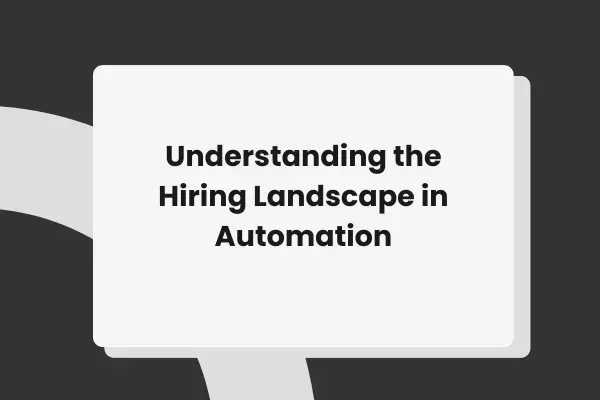How to Recruit Skilled Professionals in Automation
The automation industry in the UK and globally continues to experience rapid expansion, fuelled by demand across manufacturing, logistics, life sciences, and clean energy. Employers are under increasing pressure to modernise their operations using robotics, smart control systems, and data-driven engineering tools. This evolution depends not only on the availability of technology but also on the ability to hire and retain qualified professionals.
Recruitment in automation is highly competitive. Skilled professionals are in short supply, especially those with hands-on experience across multiple platforms or who can bridge both engineering and software disciplines. Organisations must adopt structured and forward-thinking recruitment strategies to stay ahead.
This blog explores practical strategies for successful automation recruitment, offering insight into how employers can attract candidates, reduce turnover, and strengthen long-term hiring pipelines.
Understanding the Hiring Landscape in Automation
The automation industry sits at the intersection of engineering, software, and operational systems. Roles span a variety of sectors, including industrial machinery, manufacturing plants, warehouse logistics, infrastructure, and utilities. The diversity of roles means that employers must understand the different skill sets they need at various stages of digital or mechanical transformation.
Demand has shifted significantly over the past few years. Rather than purely mechanical engineers, many firms are now prioritising professionals who have blended experience in programming, systems integration, and industrial networking. As businesses pursue smart factory and Industry 4.0 initiatives, there is a strong need for multidisciplinary talent.
This dynamic environment is why automation recruitment requires a specialised approach. Generic hiring strategies often fall short when dealing with such a technical and evolving sector.
Building an Effective Hiring Strategy for Automation
Define Job Roles Precisely
The first step in any hiring process is to define the role and its requirements clearly. In automation, roles are often broad or overlapping. For instance, a "controls engineer" might be expected to write PLC code, manage commissioning, and liaise with suppliers. Job descriptions should reflect both the core responsibilities and the technologies candidates must be proficient in. Including information on specific systems (such as Siemens TIA Portal, Rockwell Studio 5000, or ABB robotics) helps to filter the right applicants from the start.
Clarity in job scope also benefits internal teams by aligning hiring managers, HR teams, and recruitment partners around a shared goal.
Prioritise Skill-Based Hiring Over Credentials Alone
Automation is a hands-on field. While academic qualifications provide a strong foundation, practical experience and specific technical skills often matter more. Hiring managers should prioritise candidates who demonstrate proficiency in relevant tools, even if they don’t come from a traditional engineering background.
Competency-based interviews, task simulations, or problem-solving scenarios can offer better insight into a candidate’s abilities than standard interviews. Employers who can identify and hire based on skills rather than relying solely on degrees or job titles often secure better-performing candidates.
Leverage Industry-Specific Recruiters
Specialist recruiters who understand the automation space can dramatically improve hiring outcomes. Agencies like Mackinnon Bruce have built extensive networks of qualified automation professionals. These recruiters often have insight into passive candidates, individuals not actively looking but open to opportunities, who may be a strong fit for high-impact roles.
Partnering with a dedicated automation recruitment specialist makes faster placements, high-quality hires, and access to market trends. This also supports succession planning and building out entire automation teams as part of broader business transformation.
Streamline Your Hiring Process
Highly skilled automation professionals often receive multiple offers. A slow or inconsistent recruitment process can result in losing candidates to faster-moving competitors. Employers must evaluate their hiring timeline and remove unnecessary delays between application, interview, and offer.
Communicating next steps, decision timelines, and role expectations early on creates a positive candidate experience. Businesses that make efficiency a priority in the hiring process improve both acceptance rates and employer brand perception.
Attracting the Right Candidates
Promote Your Technology Environment
Professionals in automation are often drawn to companies using modern systems and technologies. Employers can strengthen their employer brand by highlighting the technology stack they use, the scale of projects candidates would contribute to, and the opportunities for hands-on innovation.
Showcasing this technology in your job adverts or on your website can attract talent who are eager to work on cutting-edge projects.
Offer Clear Development Pathways
In a sector as technical and fast-moving as automation, professionals value continuous learning. Employers who provide structured development paths, such as vendor training, internal mentorships, or exposure to project variety, are more likely to attract motivated candidates.
Clarity around career progression is especially important for mid-level professionals who want to see a future beyond their current capabilities. Firms that invest in professional development not only improve retention but also build stronger, more capable internal teams.
Consider Flexibility and Work-Life Balance
While automation roles have traditionally been site-based, there is growing demand for hybrid roles, particularly in design, programming, and remote diagnostics. Employers who offer flexible working arrangements may appeal more to experienced professionals seeking a better work-life balance.
Additionally, clear scheduling, predictable shifts, and travel transparency (especially for commissioning or field work) can reduce attrition in project-driven roles.
Retaining Automation Talent
Hiring is only part of the challenge. Keeping teams in automation is just as critical, especially as demand outpaces supply.
Support Internal Mobility
High-performing automation engineers often seek variety and growth. Creating pathways for them to move between projects, departments, or locations keeps their work dynamic and satisfying. It also prevents them from looking elsewhere for new challenges.
Internal mobility programs reduce recruitment costs and support long-term workforce planning.
Align Projects with Employee Strengths
People perform best when their roles match their strengths. When automation engineers are assigned to projects where they can apply their best skills, they deliver better outcomes and feel more engaged.
Conducting regular reviews of employee strengths and preferences can help managers assign work more strategically and keep employees engaged.
Maintain Competitive Recognition and Feedback
Timely feedback and recognition go a long way in keeping automation professionals motivated. As problem-solvers and project contributors, they want to know their input is valued. Recognition doesn’t always need to be formal. Regular updates, performance check-ins, and involvement in team decisions help foster loyalty and purpose.
The Role of Strategic Partnerships
Companies that succeed in automation recruitment often maintain strong partnerships across industry, education, and recruitment services. Collaborating with technical colleges, participating in apprenticeship schemes, or co-hosting events with vendors and recruiters helps businesses stay connected to the next generation of talent.
In the UK, these partnerships are particularly important as the pipeline of STEM graduates remains below national targets. Forward-thinking employers are stepping in to fill the skills gap through outreach, internal training, and early-career development.
Recruiting for automation roles in the UK has become increasingly complex, with demand rising across manufacturing, logistics, and infrastructure. As technology evolves, so too do the expectations of candidates, who now seek a job, AND a workplace that offers challenge, growth, and purpose.
To meet these expectations, employers must rethink their recruitment strategies. A successful automation recruitment plan combines technical clarity, skill-focused hiring, recruitment partnerships, and long-term retention strategies.
By approaching automation hiring with the same precision and strategy that define the industry’s engineering work, companies can build resilient, high-performing teams capable of driving innovation forward.
If you need support with recruitment in the automation space, working with a specialist partner like Mackinnon Bruce International can give you access to highly skilled candidates across robotics, control systems, project delivery, and beyond.





